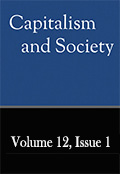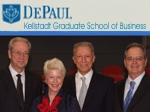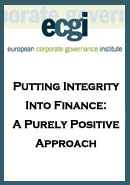Integrity - A New Model
"PUTTING INTEGRITY INTO FINANCE: A PURELY POSITIVE* APPROACH"
By Werner Erhard and Michael C. Jensen
Journal: Capitalism and Society, Volume 12, Issue 1, May 2017
Social Science Research Network (SSRN)
Harvard Business School NOM Unit Working Paper No. 12-074
National Bureau of Economic Research (NBER) Paper #19986, Issued March 2014
European Corporate Governance Institute (ECGI) Finance Working Paper No. 417/2014
*'Positive' as used here is as it is used in the sciences – it does not mean something good or desirable, it means the way integrity actually is and operates.
Abstract: We summarize our new positive theory of integrity that has no normative content, (positive as used here is from the discipline of economics – it does not mean something good or desirable, it means the way the world actually is and operates) and argue that there are large gains from putting integrity into finance – into both the theory and practice of finance. We define integrity as being whole and complete and unbroken. We argue that if finance scholars, teachers and practitioners take this approach to applications in finance there are huge gains to be achieved. Read more at SSRN. This paper is also available at:
Journal: Capitalism and Society, Volume 12, Issue 1, May 2017
Harvard Law School Forum on Corporate Governance and Financial Regulation
National Bureau of Economic Research (NBER), Also Online Appendix
This paper has been cited in the following academic publications:
Promoting Corporate Social Responsibility and Sustainability: a Model of Integrity, Society and Business Review, Vol. 10 Iss: 3, pp.280 - 305
Honoring One’s Word: CEO Integrity and Accruals Quality
"A PURELY POSITIVE* THEORY OF INTEGRITY"
Academic Paper in Progress, available at ssrn.com/abstract=1542759
*'Positive' as used here does not mean something good or desirable, it means the way something actually is.
Werner Erhard and Professor Michael C. Jensen discuss their positive model of integrity that links integrity and personal and corporate performance. They address integrity in a developing academic paper, whose primary purpose is to present a positive model of integrity that provides a powerful access to increased performance for individuals, groups, organizations, and societies.
The creation of this model reveals a causal link between integrity and increased performance. Through the work of clarifying and defining what integrity is and it’s causal link to performance, this model provides access to increased performance for private individuals, executives, economists, philosophers, policy makers, leaders, legal and government authorities.
"Simply put, integrity as we define it provides access to incredible increases in performance - in whatever performance you are interested in - as well as the personal peace and self-confidence that comes from being a well-integrated person."- Michael Jensen, Texas A&M University
This academic paper was initially presented at the Gruter Institute Conference on Values in June 2006. Since then it has been presented at the Center for Public Leadership, John F. Kennedy School of Government, Harvard University, Boston, MA, May 10, 2007; Simon School of Business, U. of Rochester; Fisher College of Business, Ohio State University, Columbus, OH, Sept. 2006; Nottingham College of Business, Nottingham, UK; ESADE Business School, Barcelona, Spain; HEC, Paris, France, Nov. 2006; Yale Symposium on Corporate Governance, Inaugural Lecture, (Yale Law School and Yale School of Organization and Management), New Haven, CT, January 2007; Gruter Institute Squaw Valley Conference: Law, Brain and Behavior, May 2007; Harvard Business School Negotiations Organizations and Markets Seminar, Sept. 2007; Yale School of Management, Sept. 2007; MIT Sloan School of Management Leadership Center, Cambridge, MA, Oct. 2007; Harvard Law School, Law, Economics and Organizations Research Seminar, Cambridge, MA, Oct. 2007; USC Marshall School of Business, Finance and Economics Dept. Distinguished Speaker Series, Nov. 2007; LeBow College Corporate Governance Conference, Philadelphia, PA, April 2008; Special Seminar Series, Business Department, Juan Carlos III University, Madrid, Spain, April, 2008; Herbert Simon Lecture, Rajk Laszlo College, Corvinus University of Budapest, Budapest, Hungary, April 21, 2008; Exeter at Said Business School, Oxford, UK, April 24, 2008; University of Rochester Simon School of Business Alumni Seminar, NYC, May 5, 2008; DePaul University Kellstadt School of Business, Chicago, IL, May 8, 2008; 1st IESE Conference on Humanizing the Firm and the Management Profession, IESE Business School, Barcelona, Spain, July 2, 2008 Stern Stewart International Finance Summit, Cape Town, South Africa, July 31, 2008; Concordia University John Molson School of Business, Montreal, Quebec, CA Sept. 16, 2008; Institute of Corporate Directors Conference on Governance and Financial Markets in North America, Montreal, Quebec, CA, Sept. 19, 2008; Duisenberg School of Finance, Amsterdam, Netherlands, Oct. 14, 2008; Paduano Faculty Research Symposium in Business Ethics, Stern School of Business, New York, Oct. 23, 2008; Olin School of Business Faculty Forum Sponsored by the Center for Research in Economics and Strategy and the Center for the Study of Ethics and Human Values, Washington University, St. Louis, MO, Nov. 6, 2008; Fisher School of Business, Ohio State U., Columbus, OH, Nov. 7, 2008; United States Air Force Academy, Platinum Series, Colorado Springs, CO, Jan. 21, 2009; Texas A&M Distinguished Lecture Series, College Station, TX, Feb. 10, 2009; Social Innovation Research Seminar Series, INSEAD, Fontainebleau, France, March 16, 2009; Distinguished Scholar/Teacher Lecture Series, McCombs School of Business, University of Texas, Austin, Tx, Nov. 12, 2009; Hankamer School of Business, Baylor University, Waco, TX, Nov. 13, 2009; Washington University Olin School of Business, March 26 2010; Wake Forest University, Schools of Business, January 31, 2011.
This paper in progress has been cited in the following academic publications:
The Value of Truth Telling, Negative memes in the infosphere pose mortal threats, transforming lies and other offensive messages into strategic disabilities, Hayes-Roth, Rick, Naval Post Graduate School
Toward Effective Codes: Testing the Relationship with Unethical Behavior Muel Kaptein, Journal of Business Ethics; Muel KapteinThe Risk‐based Approach to Anti‐Money Laundering: Problems and Solutions, Journal of Money Laundering Control; Anna Simonova
The Value of Corporate Culture, Journal of Financial Economics; Luigi Guisoa, Paola Sapienzab, Luigi Zingalesc
__________________________________________________________
The Multiple Facets of Integrity in Business and Management, Marc Orlitzky, Manjit Monga (editors); Chapter 2: “Integrity: A Positive Model that Incorporates the Normative Phenomena of Morality, Ethics and Legality (Abbreviated Version)” by Werner Erhard, Michael C. jensen and Steve Zaffron
The editors write: "In Chapter 2, Erhard, Jensen, and Zaffron present an eminently well-argued, positive model of integrity, which clearly differentiates integrity from morality and ethics. They argue that integrity, a necessary condition for the workability and optimum performance of organizations, exists in a positive realm and, therefore, can be the subject of social scientists' descriptive, observational study of behavior. Their definition of integrity as honoring your word is clearly differentiated from the normative realm of morality, ethics, and legality. The authors show that defining integrity as honoring one's word provides an unambiguous and actionable access to the opportunity for superior performance and competitive advantage at different levels of analysis and empowers the three virtue phenomena of morality, ethics, and legality."
___________________________________________________
Links:
Integrity: A Positive Model that Incorporates the Normative Phenomena of Morality, Ethics, and Legality - Abridged: Social Science Research Network
Integrity: Without It Nothing Works:
Article published in Rotman Magazine: The Magazine of the Rotman School of Management, pp. 16-20, Fall 2009
A New Model of Integrity: The Missing Factor of Production (PDF file of Keynote and PowerPoint Slides)
Harvard Business School Working Knowledge:
A First Look at Faculty Research - Integrity: Without It Nothing Works
A New Model of Integrity: An Actionable Pathway to Trust, Productivity and Value: Social Science Research Network
Presentation at the Center for Public Leadership, Kennedy School of Government, Harvard University: Social Science Research Network
Public Intelligence - Integrity: Without It Nothing Works
"Beyond Coordination and Control Is... Transformation": EconomicPrinciples.com, David Warsh
Do Markets Need Integrity?: A Publication of the Yale School of Management
Harvard Business School: '‘First Look’' December 8, 2009
Harvard Business School: 'First Look' March 3, 2010
Watch Michael Jensen and Steve Zaffron discussing Integrity: Duisenberg School of Finance
Watch Michael Jensen's presentation on Integrity at HEC Paris
The Integrity Paper has been cited in the Handbook of Leadership Theory and Practice, by Nitin Nohria (Dean of Harvard Business School) and Rakesh Khurana (Dean of Harvard College)
Michael C. Jensen Delivers Georgetown University's McDonough Shool of Business Commenment Address
La integridad no es una virtud, es una ley
USC Marshall School of Business, Finance and Economics Dept. - Distinguished Speaker Series, November 2007
Public Intelligence: Reference: Integrity - A New Model
Michael C. Jensen - Keynote Speech on Integrity at University of British Columbia
A New Model of Corporate Integrity: Harvard Prof. Emeritus Michael Jensen discusses a new model of integrity and its application to corporate finance and management at the Kellogg School of Management
The Hidden Power of Integrity and Access to Vast Increases in Performance Harvard Professor Emeritus Michael C. Jensen's presentation given at entrepreneurship@UBC, University of British Columbia
How Integrity Can Save Your Company (And The World): Michael C. Jensen in the Wall Street Journal, Oct 12, 2012
OJK Integrity 2019: Article about the Financial Services Authority of Indonesia in Investor Daily (Indonesian language newspaper), by Achmad Deni Daruri, Dec 12, 2109
What Others Say About This New Model of Integrity
Bartley J. Madden, independant researcher and Senior Fellow at the National Center for Policy Analysis (NCPA), writes, "Recent work by Werner Erhard, Michael Jensen, and Steve Zaffron (2008) views integrity as important a factor of production as technology or knowledge. They see integrity as a potential source of outsized gains in organizational performance and, they say, "without integrity nothing works."
"They define integrity to mean honoring your word, and honoring your word to mean 'you either keep your word, or as soon as you know that you will not, you say you will not be keeping your word to those who were counting on your word and clean up any mess you caused by not keeping your word.'
"In their view, integrity is required in order to gain workability and the trust of others that in turn opens up the opportunity for high performance. In other words, the absence of integrity relegates the firm to no better than average long-term performance. Allan Scherr, who is also involved with this research, documented the importance of trust, based on his long-term managerial experience at IBM (Erhard, Jensen, and Zaffron, 2008, Appendix B).
"Scherr noted that the loss of integrity within IBM was such that the group assigned to develop IBM's first personal computer felt that they could not depend on other groups within IBM to fulfill commitments they would make. Even though superior technologies needed for the PC existed in-house, the lack of trust resulted in IBM's personal computer group farming out development of the operating system to Microsoft and of the microchip to Intel. These enormous business opportunities were essentially gifted to Microsoft and Intel and forfeited by IBM because of IBM's defective culture."
_______________________
Jaap Winter, Professor of Corporate Governance at the Duisenberg school of finance in Amsterdam was the first Dean of the Duisenberg school of finance, setting up the school in 2008-2009. He is also Professor of International Company Law at the University of Amsterdam. In his article Corporate Governance Going Astray: Executive Remuneration Built To Fail, published in the book, Research Handbook on Executive Pay (2012), by John S. Beasley, he writes, "Integrity in the sense developed by Erhard, Jensen, and Zaffron, means whole and complete. People have integrity when their word to others is whole and complete. This requires honoring your word, which is either to keep your word and do what you said you would do (at the same time and in the same manner you said or implied you would) or, as soon as it becomes clear that you will not keep your word (because you cannot or no longer want to keep your word), tell the other who relies on your word that you will not keep it and deal with the problem that you have created for the other by not keeping your word. By honoring your word it remains credible and as a person you remain effective. The same is true for an organization. Acting with integrity enhances productivity and creates value (Erhard et al. 2009). Lack of integrity can exist within the boundaries of any set of given rules and also then has the effect of reducing effectiveness and productivity. Substantial performance-based systems have the same effect: as long as we stay within the rules and procedures we fail to see that there may be massive integrity problems. Removing the blind spot allows us to focus on integrity as an essential ingredient of performance."
_______________________
Li-Hwa Hung, Assistant Professor at the Department of Business Administration & Graduate Institute of Business and Management, Chien Hsin University in Jung-Li, Taiwan, in her article titled Integrity and Leadership: A Positive Development Approach published in the book, Integrity in Organizations: Building the Foundations for Humanistic Management (2012), by W. Amann and A. Stachowicz-Stanusch, writes, "Jensen (2009) defined integrity as a state or condition of being whole, complete, unbroken, unimpaired, sound, in perfect condition. Integrity is a purely positive phenomenon. It has nothing to do with good or bad, right behavior versus wrong behavior. Like the law of gravity, the law of integrity just is, and if you violate the law of integrity you can get hurt just as if you tried to violate the lawy of gravity with no safety device. Further, for an individual, group, or organization, Jensen and Erhard (2007) indicated that integrity is honoring one's word. Honor your work in one of two ways: first by keeping your word, and on time as promised; or second, as soon as we know that we will not keep our word, we inform all parties involved and clean up any mess that we have caused in their lives. When we do this, we are honoring our word despite not having kept it, and we have maintained our integrity."
________________________
The Multiple Facets of Integrity in Business and Management, Rutledge, 2018. Chapter 2, “Integrity: A Positive Model that Incorporates the Normative Phenomena of Morality, Ethics and Legality (Abbreviated Version)” by Werner Erhard, Michael C. Jensen and Steve Zaffron. The editors, Professors Marc Orlitzky and Manjit Monga write:
"In Chapter 2, Erhard, Jensen, and Zaffron present an eminently well-argued, positive model of integrity, which clearly differentiates integrity from morality and ethics. They argue that integrity, a necessary condition for the workability and optimum performance of organizations, exists in a positive realm and, therefore, can be the subject of social scientists' descriptive, observational study of behavior. Their definition of integrity as honoring your word is clearly differentiated from the normative realm of morality, ethics, and legality. The authors show that defining integrity as honoring one's word provides an unambiguous and actionable access to the opportunity for superior performance and competitive advantage at different levels of analysis and empowers the three virtue phenomena of morality, ethics, and legality. This chapter is most consistent with the conceptualization as behavioral integrity, the first facet of integrity introduced above."
Read Werner Erhard's Academic Papers
Putting Integrity Into Finance: A Purely Positive Approach, by Werner Erhard and Michael C. Jensen, Published by Columbia University's Center on Capitalism and Society in their Journal: Capitalism and Society, Volume 12, Issue 1, May 2017
Professor Michael C. Jensen spoke to Georgetown’s McDonough School of Business’ graduating seniors about integrity and authenticity
Werner Erhard creates and shares new models and paradigms with great thinkers and universities around the world.
Integrity
A Business Conference -
May 8, 2008
Working Paper by Werner Erhard and Michael C Jensen
Working Paper by Werner Erhard and Michael C Jensen





